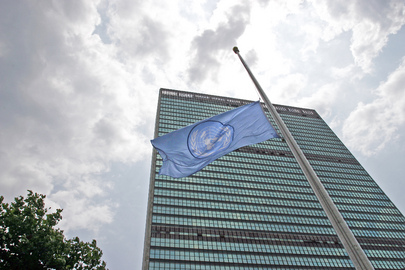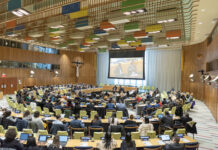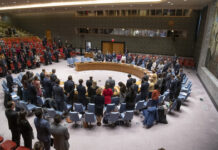This is the News in Brief from the United Nations.
Over 200 direct hits on schools in Gaza
The Israeli bombardment of Gaza has included “direct hits” on 212 schools in the enclave, a new UN report has found.
Based on satellite imagery taken since war erupted on 7 October last year in response to Hamas-led terror attacks, the UN Children’s Fund, UNICEF, said that at least 53 schools have been “totally destroyed”.
The report by UNICEF and NGO partners the Education Cluster and Save The Children found a “high trend of attacks on school facilities” amid “intense Israeli bombardment from air, land, and sea across much of the Gaza Strip”.
Of Gaza’s 563 school buildings spread across five governorates, 62 were directly targeted in Khan Younis, 14 were hit in the Middle Area, along with 94 in Gaza and 42 in North Gaza – where more than 86 per cent of educational structures were either directly hit or damaged.
No education has been happening in Gaza “at all for nearly six months,” the UN agency for Palestinian refugees, UNRWA, said on Wednesday, upon publication of the UN-partnered report.
Additional findings derived from the satellite imagery and other sources “provide evidence for military use of schools” by Israeli Security Forces “since the beginning of the escalation”.
This includes their use as “detention, interrogation centres and military bases” while satellite pictures also showed military tanks stationed in school premises, alongside craters from shellfire.
783 million people go hungry today but one-fifth of all food goes to waste
While a third of humanity goes hungry, an equivalent of one billion meals go to waste every day.
That’s one of the astonishing findings of a new report from the UN environment agency on Wednesday, which revealed that nearly one-fifth of food is thrown away.
The UNEP Food Waste Index report found that 19 per cent of food available to consumers was lost overall in shops, restaurants and in the home.
That is in addition to around 13 per cent of food lost in the supply chain from field to plate, according to the UN Food and Agriculture Organization.
Inger Andersen, head of UNEP, described food waste as a “global tragedy”. Millions will go hungry today as food is wasted across the world,” she said, adding that the problem negatively impacts the global economy and exacerbates climate change, biodiversity loss and pollution.
On average, each person wastes 79 kilogrammes of food annually. This is the equivalent of 1.3 meals every day for everyone in the world impacted by hunger, according to the UNEP report.
Food assistance to Cameroon refugees at risk amid funding shortages
To Cameroon, where vital food assistance to refugees in the country may cease unless funding shortfalls can be filled, UN humanitarians have warned.
The alert from the UN refugee agency, UNHCR and the UN World Food Programme, WFP, affects vulnerable people sheltering in Cameroon’s Far North, Adamawa, East and North regions.
Rations have already been cut in half in these regions, meaning that food baskets have been missing basic staples including pulses, vegetable oil and salt.
“Without immediate support we will have no option but to further cut the already meagre portions on refugees’ plates, with all the devastating impacts this will bring including rising malnutrition and hunger,” said Wanja Kaaria, WFP Country Director in Cameroon.
Ms. Kaaria explained that families facing hunger cope by pulling children out of school and eating less food; this affects women and children especially, she warned.
Cameroon continues to be affected by three humanitarian crises; one is in the Far North and linked to violence and insecurity close by in Lake Chad and Nigeria, the second is the Northwest and Southwest regions, where armed groups are fighting Government forces, and the third is in neighbouring Central African Republic.
Thousands of people have been uprooted by fighting to Cameroon, meaning that the country now hosts more than half a million refugees and asylum-seekers.
The $371 million humanitarian response plan for Cameroon is only five per cent funded.
Daniel Johnson, UN News.
Source of original article: United Nations (news.un.org). Photo credit: UN. The content of this article does not necessarily reflect the views or opinion of Global Diaspora News (www.globaldiasporanews.com).
To submit your press release: (https://www.globaldiasporanews.com/pr).
To advertise on Global Diaspora News: (www.globaldiasporanews.com/ads).
Sign up to Global Diaspora News newsletter (https://www.globaldiasporanews.com/newsletter/) to start receiving updates and opportunities directly in your email inbox for free.






























